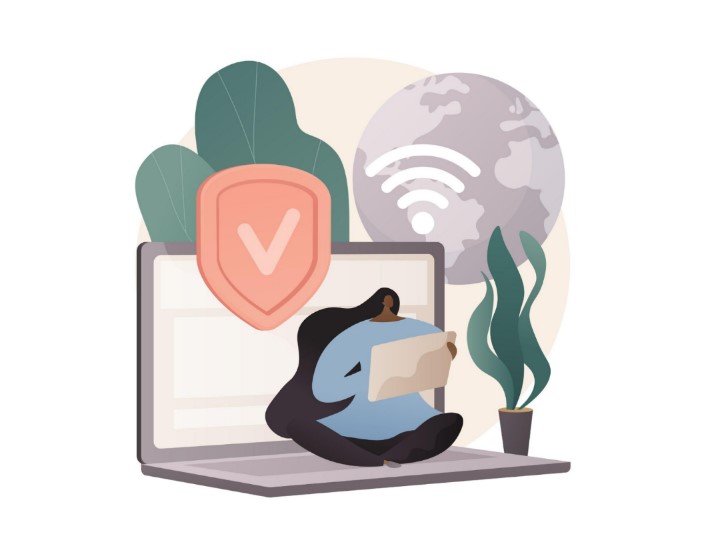Today, cybercrime is more rampant than ever before, costing the world a whopping $6 trillion in losses in 2021. It also leads to loss of data, productivity, and intellectual property and causes the collapse of businesses. The disastrous effects of this type of crime necessitate protective measures, one of which is the use of proxies. In addition to promoting cybersecurity – and we’ll explain how they achieve this – proxies also enable companies and individuals alike to access data by facilitating web scraping. Against this background, proxies are significantly important in 2022, which is why we have created this ultimate guide to proxies.
What is a Proxy?
A proxy is a virtual or real intermediary that is found between a user’s computer and a web server. It routes all requests and responses from the browser and server, respectively, through itself. It also assigns outgoing requests a new IP address, hiding the real one in a process that promotes online anonymity.
There are different types of proxies, including:
1. Datacenter proxies
2. Residential proxies
3. HTTP proxies
4. SOCKS proxies
5. Forward proxies
6. Reverse proxies
7. Static proxies
8. Rotating proxies
9. Transparent proxies
10. Shared proxies
11. Dedicated proxies
12. Anonymous proxies
13. High anonymity proxies
Uses of Proxies
Proxies are ideal for different uses cases, including:
1. Anonymizing outgoing requests: proxies assign outgoing traffic a new IP address, effectively hiding their real IP
2. Web scraping: market research, review monitoring, collecting contact information for lead generation purposes
3. Social media management: social media platforms limit the number of accounts that can be created using the same IP address; thus, residential proxies are used by social media managers to bypass this restriction
4. Promote security: HTTP/HTTPS proxies filter requests and responses to prevent malicious files from reaching a user’s computer or server
5. Block access to web pages: Transparent proxies block access to specific sites without letting users know that their network is connected to a proxy
6. Bypass firewalls: SOCKS proxies are used to bypass firewalls
7. Improve productivity and reliability: Reverse proxies promote a smoother flow of traffic between servers and browsers
8. Prevent DDoS attacks: Reverse proxies protect servers from attacks such as distributed denial of service (DDoS)
9. Load balancing: proxies balance internet traffic by distributing the content among various servers, preventing crashes
10. Caching files: proxies store frequently accessed files, thereby reducing a website’s loading time
11. Access geo–blocked content: by assigning country-specific IP addresses, proxies enable users to access content that is only displayed to residents of a particular country
12. Forward requests: forward proxies send/pass requests from a user’s computer to a web server
Top 8 Factors to Consider when Choosing a Proxy Provider
To enjoy the full benefits of these vital solutions, it is important to choose a reliable service provider. Here are 8 factors you need to consider when choosing a proxy provider:
1. Purpose (type of proxy)
2. Reliability and reputation
3. IP network pool
4. Geographical distribution of the addresses
5. Customer service
6. Ethics
7. Proxy management tools
8. Price
1. Purpose
The purpose for which you intend to use the proxy is a primary factor when selecting a provider that offers proxy services. This is because it helps you isolate the company that offers a specific type of proxy, be it a residential, reverse, or datacenter proxy.
2. Reliability and Reputation
A reliable service provider guarantees success as you can be sure that their proxies will have high uptime. Reliability also points to the fact that the provider has deployed a number of features that boost the success rate. You can assess the reliability by going through reviews on the provider’s services.
3. IP Network Pool
A good provider should have an extensive IP network pool.
4. Geographical Distribution of IP Addresses
The IP addresses that form the IP network pool should cover tens of countries. This is because proxies are used to bypass geo-restriction. So, if you wish to access content from different countries, your provider should be capable of facilitating this by having IP addresses from various locations.
5. Customer Service
A reputable service provider should have 24/7 customer support to offer help when the need arises.
6. Ethics
Some proxies, e.g., residential proxies, are unique in the sense that they route traffic through real users’ computers. In this regard, these users should consent to this and be compensated in return. Thus, a good service provider ethically obtains residential IP addresses.
7. Proxy Management Tools
A good provider of proxy services should provide a dashboard that enables customers to manage the proxies they have procured. For example, Oxylabs has an easy-to-use dashboard where you’ll see your user statistics and will be able to manage proxies effectively.
8. Price
Free proxies are less secure and slow as they share the bandwidth among multiple users. On the other hand, proxies with a price tag offer a level of security and speed.
Conclusion
In understanding the crucial role of proxies in 2022, we have detailed the top 8 factors to consider when choosing a proxy service provider. These include purpose, reliability, IP network pool, distribution of IP addresses, ethics, proxy management tools, customer service, and price.















